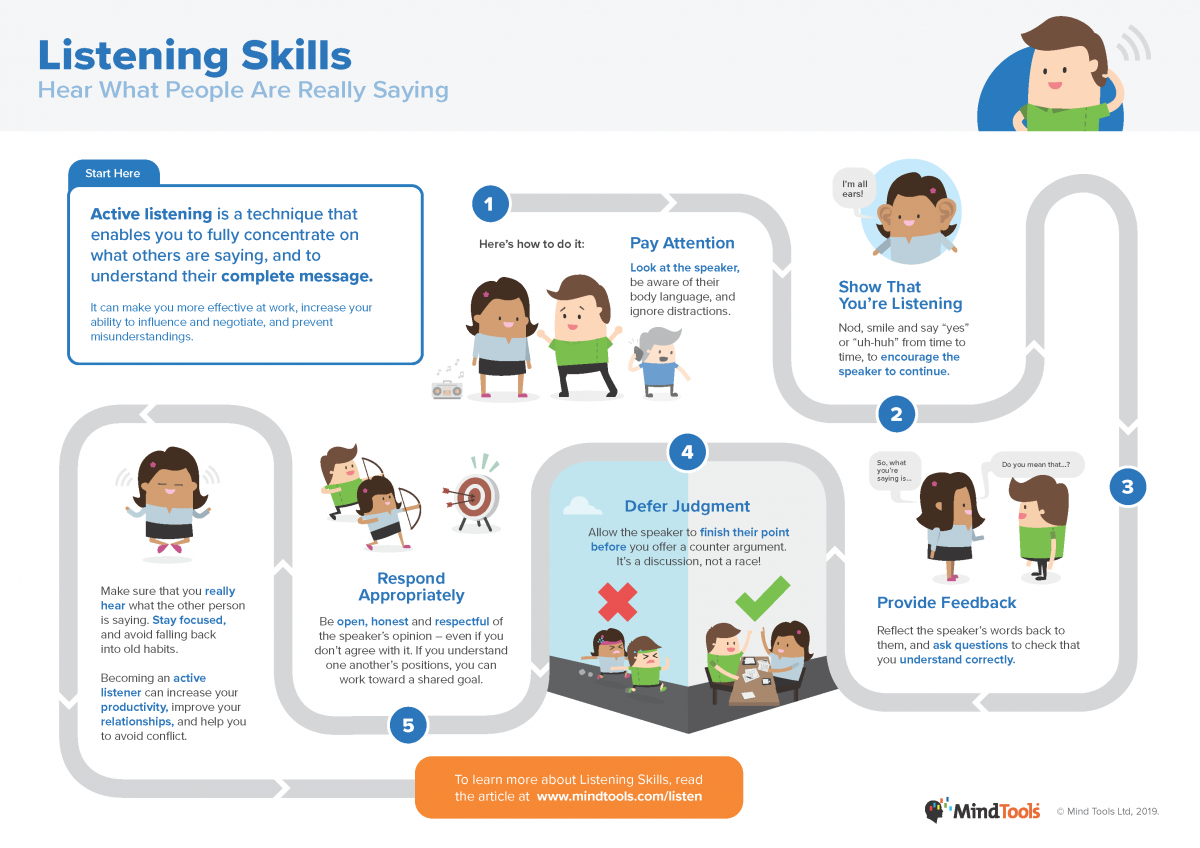The Well offers a variety of violence prevention and bystander intervention programs, events, and educational campaigns on campus. Our goal is to create a community-centered approach to prevent and end sexual violence with a supportive campus environment for survivors.
| If you have experienced sexual assault/sexual violence, Get Help Now |
Primary Prevention
Primary Prevention includes approaches that take place BEFORE violence has occurred to prevent initial perpetration or victimization. Primary prevention includes building an environment that encourages well-being and healthy choices.
What is Social-Emotional Learning?
Social and emotional learning (SEL) is the process through which people acquire and effectively apply the knowledge, attitudes, and skills necessary to understand and manage emotions, set and achieve positive goals, feel and show empathy for others, establish and maintain positive relationships, and make responsible decisions.
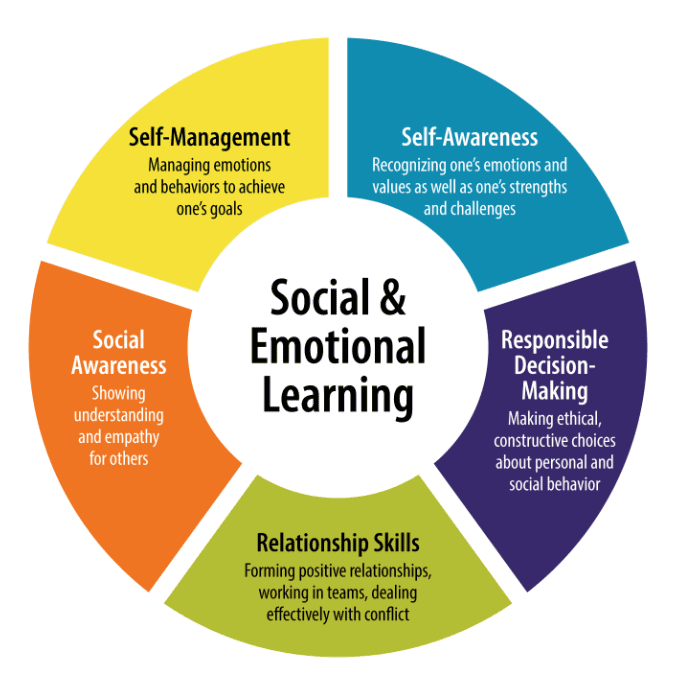
Why is Social-Emotional Learning essential for power-based violence prevention?
All forms of power-based violence – sexual violence, racist violence, transphobia, homophobia – are learned behaviors. These behaviors are learned directly or indirectly, consciously or unconsciously from our families, peers, educators, spiritual leaders, and the media we consume. ;It is also sometimes a response to abuse, neglect, exclusion, alienation from one's community, having low self-worth, or the inability to handle emotions such as anger, frustration or sadness. So, we could argue that if people can learn how to be violent, they can also learn to be nonviolent, right? But how?
Social-emotional learning provides the skills, behaviors, and attitudes that all people need to have healthy and safe relationships with themselves and others. At Tulane, our power-based violence prevention techniques are grounded in several pillars of SEL – building empathy, overcoming implicit and explicit bias, learning healthy relationship skills, creating strong communities of support, and developing of self-identification that affirm intrinsic value and dignity of self and others.
What is empathy and why is it so important?
How can I build my empathy skills?
- Practice identifying your emotions and guessing other people's feelings based on body language and communication. Paying attention to the ever-changing nature of our own thoughts and emotions may help you to understand others’ experiences and empathize with others’ emotions and behaviors accordingly.
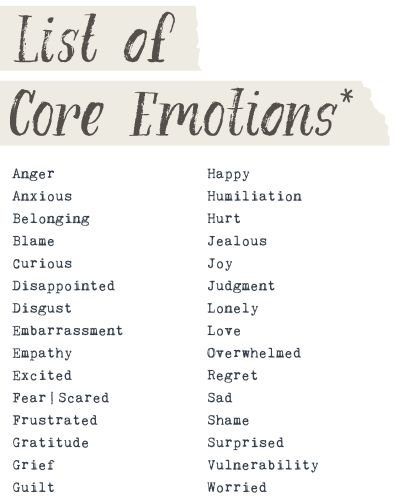
- Improve your active listening skills.We may think listening comes naturally but many of us practice terrible listening skills. Find yourself scrolling through your phone when chatting with friends or impatiently waiting for friends to finish their sentence so you can add your thoughts? You may need to work on your active listening skills.
Want to learn more about active listening? Check out this article with step-by-step guidance on how to actively listen when having a conversation with another person.
- Avoid empathy blocking statements and behaviors. Empathy blockers are words that seek to distract from the situation and force someone to move on from it, whether or not they’re ready to. They’re often used by people in an attempt to protect someone else from emotional pain. “Everything happens for a reason” — it’s said to children and adults alike. We use it when we don’t know what to say and we’re trying to make someone feel better. But, in reality, we’re communicating that the person shouldn’t feel sad, or angry, or slighted, and that they should simply accept the situation and quickly move past their emotions. When we use empathy blockers with children, we stunt their emotional growth, but when we help them work through challenging situations, we they build resilience and develop emotional maturity.
Examples of Empathy Blockers:
- GIVING ADVICE, PROBLEM SOLVING, “FIXING” WITH PRESCRIPTIONS
- Listener tells the speaker what they should do.
- STATIC JUDGEMENT / DIAGNOSING
- Listener interprets or evaluates speaker’s behavior.
- Labels speaker with static judgement or diagnosis. (Example: "You're just overreacting." "I think you are misinterpreting what happened." "You're getting really defensive.")
- PERSONAL STORYTELLING
- Listener takes the focus away from speaker and tells stories relating back to themself.
- SYMPATHY / FEELING SORRY FOR THE OTHER PERSON WITH PITY
- Listener shares their own feelings about what the speaker said rather than holding space to honor the speaker’s feelings and needs.
- DISMISSING DIFFICULT FEELINGS
- Listener tries to make the speaker feel better with dismissive comments, even if well-intentioned, like “everything is going to be okay.”
- Listener tells the speaker that “there is no need to feel that way.” Dismisses these feelings instead of holding space for them as indicators of unmet needs.
- SARCASM
- Listener replies with sarcasm, attempts to make a joke or inject humor into conversation.
- OVER-IDENTIFYING
- Listener assumes the speaker’s story has to do with them; asks if there is something they can do and/or inserts themself into the narrative.
- CHANGING THE SUBJECT
- Listener makes a connection to something the speaker says and decides to shift the topic.
- INTERROGATING / LEADING QUESTIONS
- Listener uses directed or continued questioning to prompt speaker into explanation.
- Listener challenges speaker into “self-awareness.
- Subtle blame. New age bullying. Power over.
- COMMISERATING
- Listener agrees with the speaker through over-identification; does not honor the uniqueness of speaker's position. (“I know exactly what you mean.”)
- ONE-UPPING
- Listener convinces the speaker that they've been through something worse than what the speaker is currently describing.
- DEFENSIVENESS
- Listener is acutely sensitive to criticism where there is none intended, gets defensive or dismissive of the speaker. Listener focuses on perceived criticism
instead of the speaker's unmet needs.
- Listener is acutely sensitive to criticism where there is none intended, gets defensive or dismissive of the speaker. Listener focuses on perceived criticism
- DEVILS ADVOCATE / EMPATHY FOR “OTHER”
- Listener plays devil's advocate or asks the speaker if they've considered the other person’s perspective. Tries to empathize with the “other” before the speaker.
- INTELLECTUALIZING
- Listener references expert opinion, academic studies, a book or article they recently read, or other “authoritative” source to make a point.
Implicit bias refers to the attitudes or stereotypes that affect our understanding, actions, and decisions in an unconscious manner. These biases, which encompass both favorable and unfavorable assessments, are activated involuntarily and without an individual's awareness or intentional control. Residing deep in the subconscious, these biases are different from known biases that individuals may choose to conceal for the purposes of social and/or political correctness. Rather, implicit biases are not accessible through introspection.
The implicit associations we harbor in our subconscious cause us to have feelings and attitudes about other people based on characteristics such as race, ethnicity, age, and appearance. These associations develop over the course of a lifetime beginning at a very early age through exposure to direct and indirect messages. In addition to early life experiences, the media and news programming are often-cited origins of implicit associations.
As convincing research evidence accumulates, it becomes difficult to understate the importance of considering the role of implicit racial biases when analyzing societal inequities. Implicit biases, explicit biases, and structural forces are often mutually reinforcing.
The Kirwan Institute has created an Implicit Bias Module to introduce you to insights about how our minds operate and help you understand the origins of implicit associations. You will also uncover some of your own biases and learn strategies for addressing them. The modules are free, easy to use, and can be completed in 45-90 minutes. To access the Implicit Bias Module Series, visit: kirwaninstitute.osu.edu/implicit-bias-module-series.
- Coming Soon
- Coming Soon
Healthy Relationships
Relationships may be defined in different ways depending on who’s involved, but healthy relationships all depend on a few key elements: healthy communication, healthy boundaries, mutual respect, and support for one another.
What is a healthy relationship?
In healthy relationships, both people are equals. Things both partners do: don't change themselves to make the other happy, give each other space, feel safe bringing up things that make them upset, decide on what to do together or take turns, check in about sexual activity, make it comfortable for either of them to say no.
Characteristics of a healthy relationship
Healthy Relationships are based on equality and respect. Everyone deserves to be in a safe and healthy relationship. Do you know if your relationship is healthy? Use this checklist to see if your relationship has the characteristics of a healthy relationship!
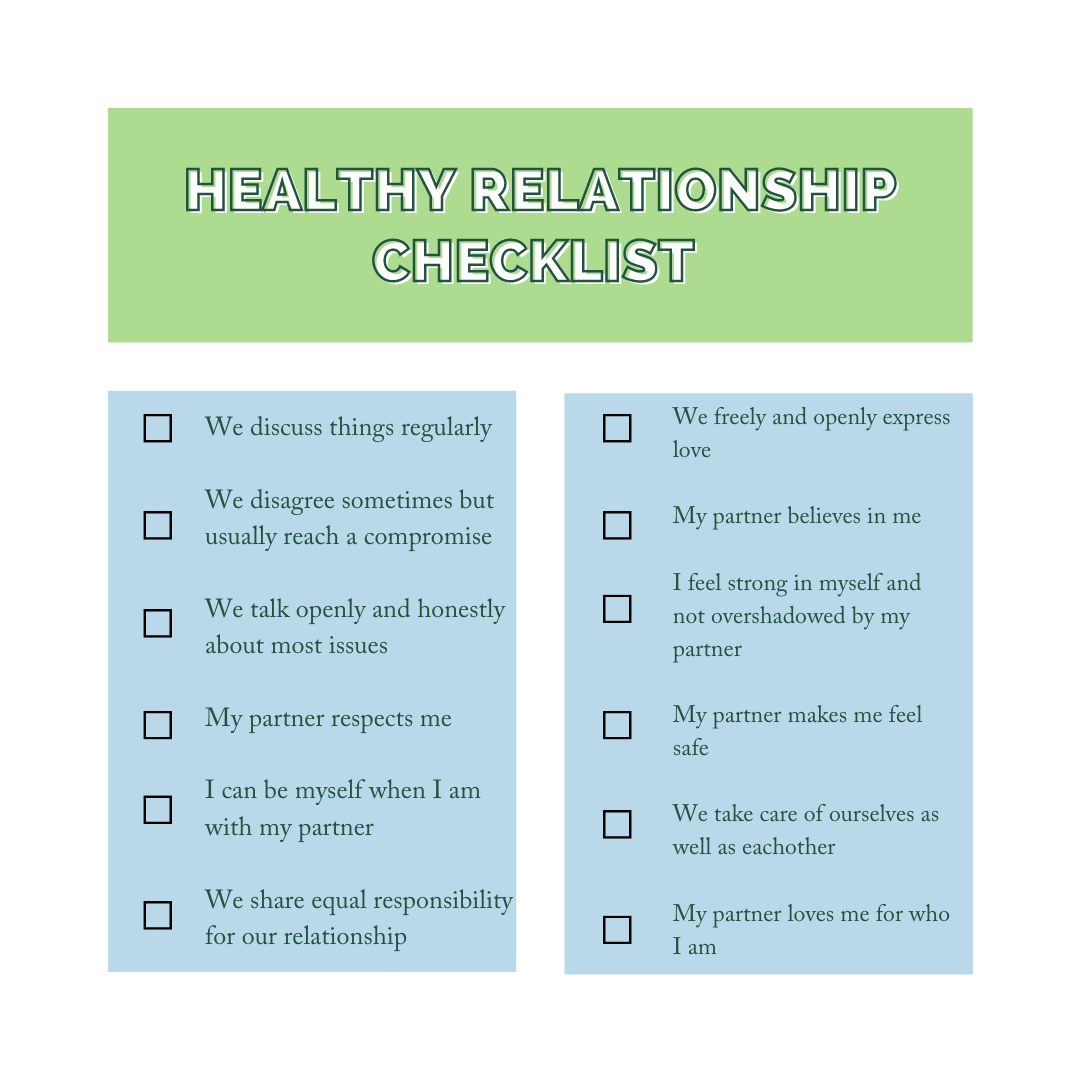
Characteristics of an unhealthy relationship
It's important to pay attention to signs of an unhealthy relationship before they escalate into abusive behaviors. Unhealthy relationships are characterized by attempts to control the other person or persons. Are you in an unhealthy relationship? Use this checklist to see if your relationship has the characteristics of an unhealthy relationship.
If you think you are in an unhealthy relationship and want to talk to someone, please check out our Resource section below for on campus, off campus, and community specific resources.
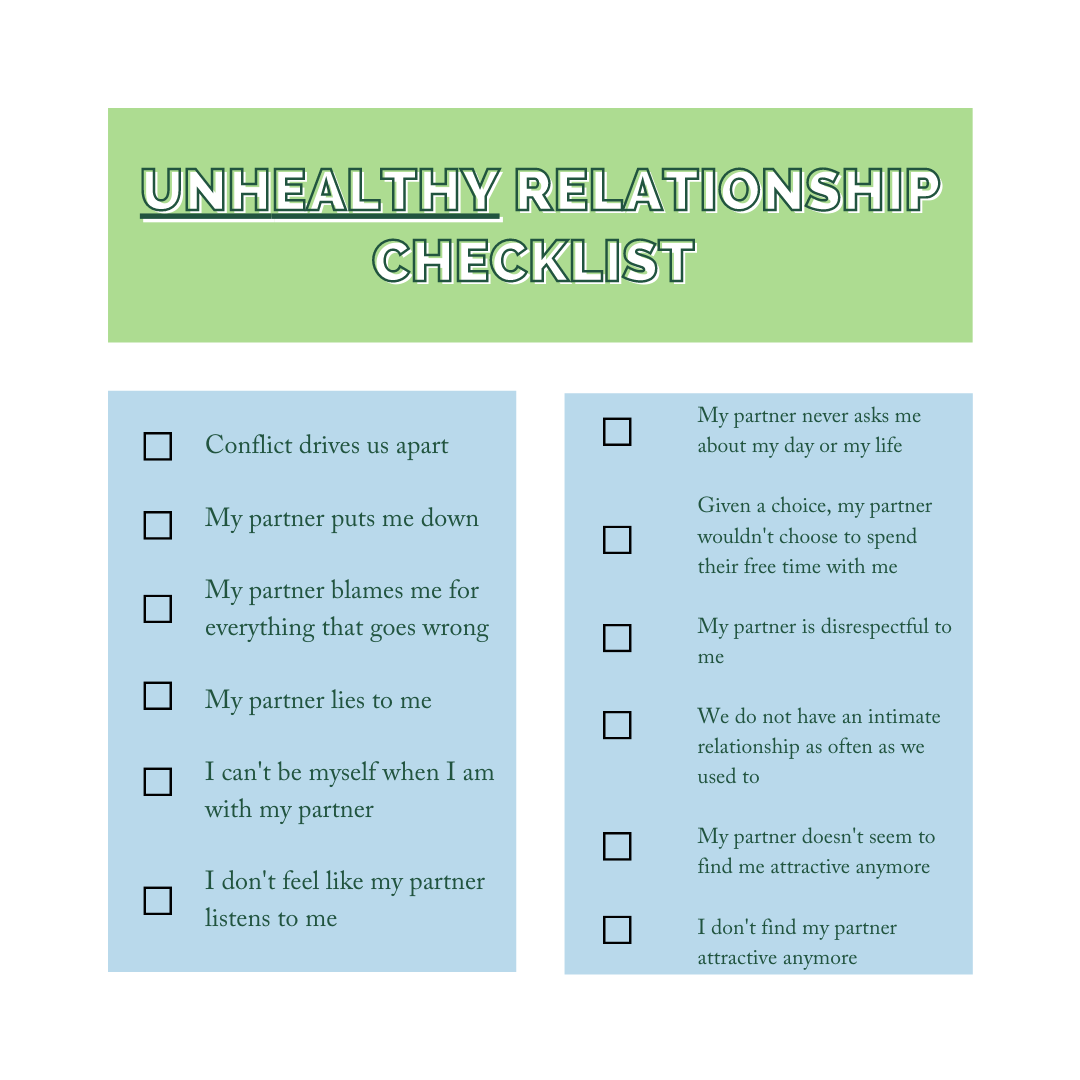
Dating abuse is a pattern of coercive, intimidating, or manipulative behaviors used to exert power and control over a partner. While we define dating violence as a pattern, that doesn’t mean the first instance of abuse isn’t also dating violence; we simply recognize that dating violence tends to involve a series of abusive behaviors over a course of time. If you are concerned about your relationship, use this checklist to identify red flags that your relationship might be abusive.
If you need help or would like to talk to someone about your relationship, please check out the Resource section below and contact a resource that feels most safe to you. You should not go through this alone and there are people here to support you.
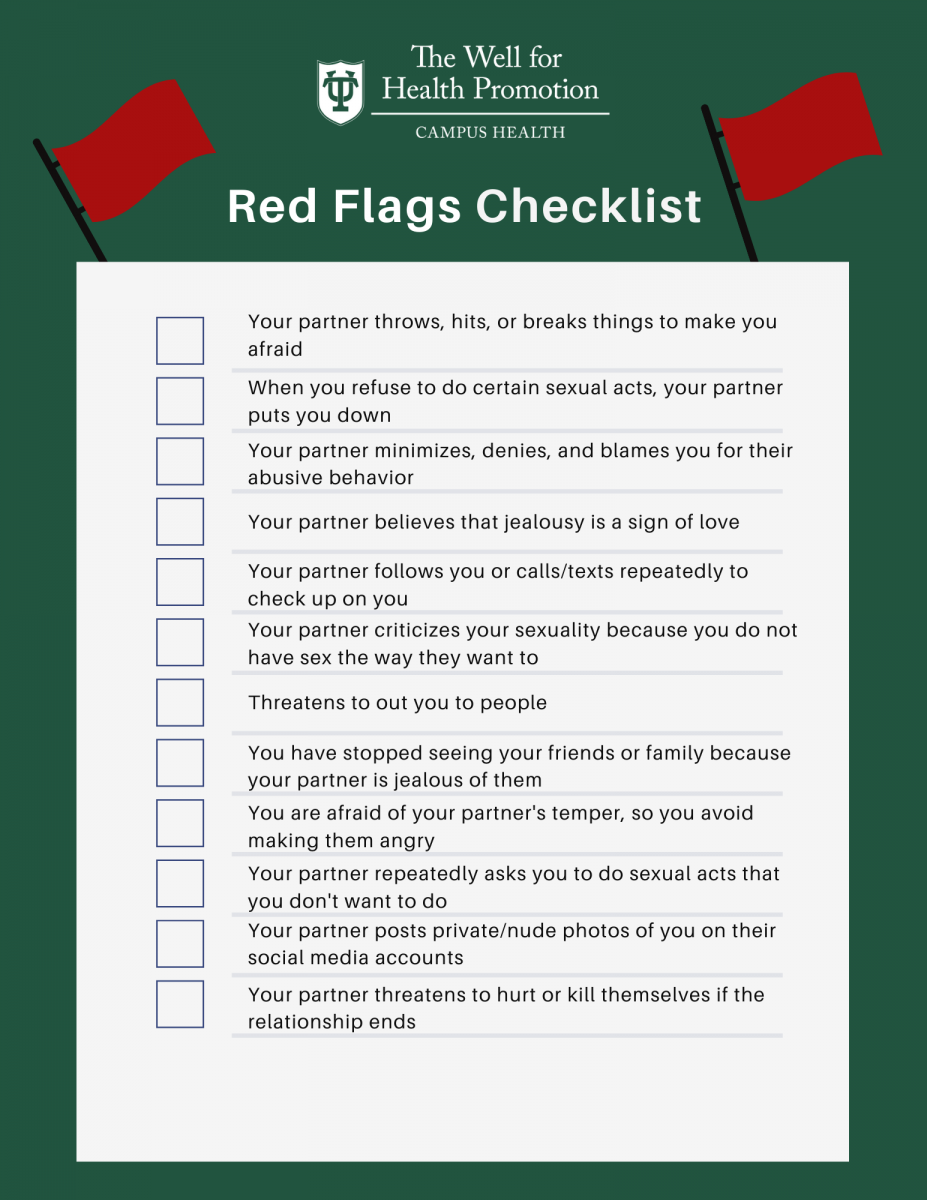
For a printable .pdf version of the checklist, click here.
Physical and sexual assaults, or threats to commit them, are the most apparent forms of domestic violence and are usually the actions that allow others to become aware of the problem. However, regular use of other abusive behaviors by the batterer, when reinforced by one or more acts of physical violence, make up a larger system of abuse. Although physical assaults may occur only once or occasionally, they instill threat of future violent attacks and allow the abuser to take control of a person's life and circumstances.
The YWCA Power and Control Wheel diagram is a particularly helpful tool in understanding the overall pattern of abusive and violent behaviors, which are used by a batterer to establish and maintain control over his partner. Very often, one or more violent incidents are accompanied by an array of these other types of abuse. They are less easily identified, yet firmly establish a pattern of intimidation and control in the relationship.
For a printable .pdf of the power and control wheel, click here.
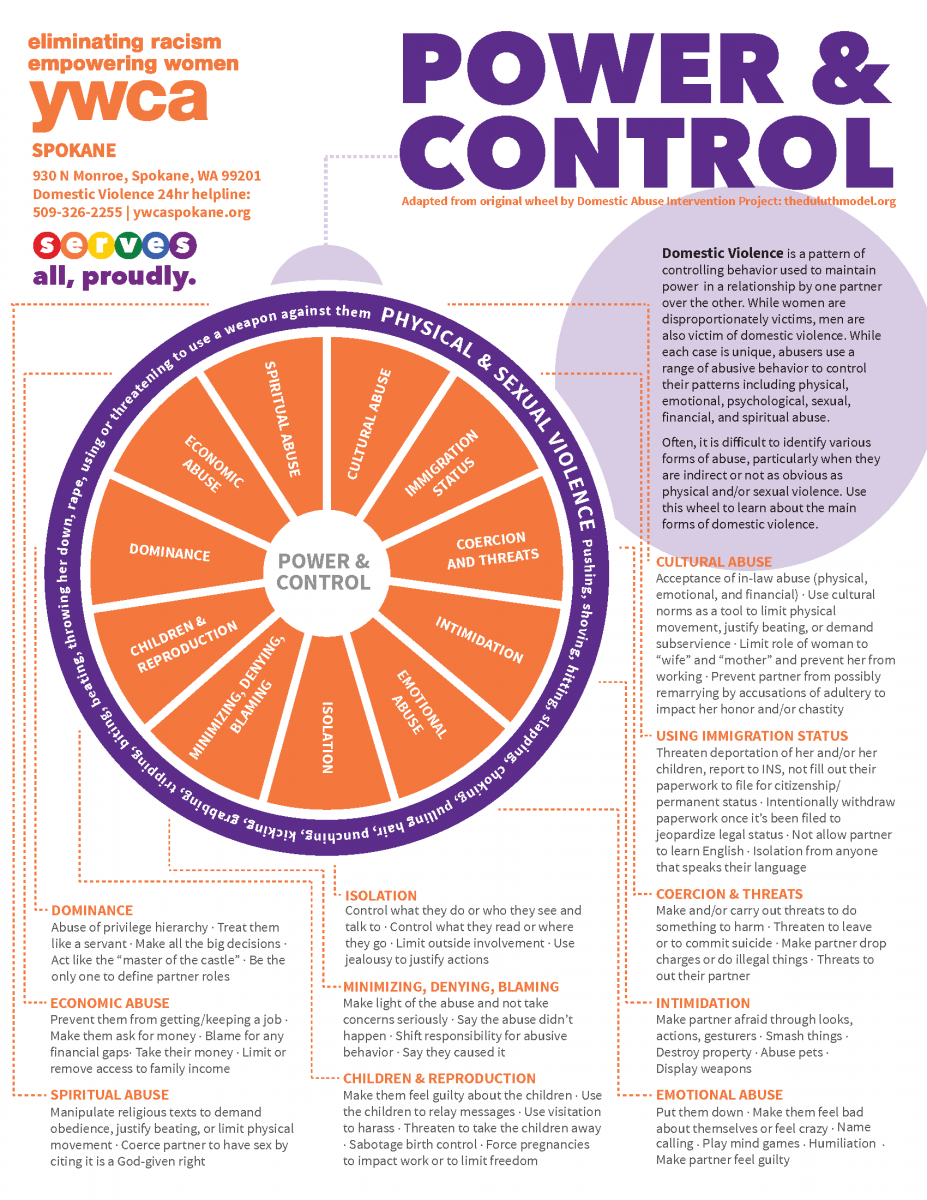
- Coming Soon
- Coming Soon
| On Campus Resources | Off Campus Resources | Online Resources |
| Counseling and Psychiatric Services (CAPS) | The New Orleans Family Justice Center offers a 24-hour crisis hotline (504-866-9554), counseling, advocacy, support groups, and resource referrals to victims of sexual assault, dating violence, stalking, and domestic abuse. | National Domestic Violence Hotline: (24/7 hotline) 1-800-799-7233 or (online chat) www.thehotline.org |
| Case Management and Victim Support Services | Loveisrespect.org: 866-331-9474 or text LOVEIS to 22522 | |
| SAPHE Peer Hotline-24/7 support for sexual violence and IPV at (504) 654-9543 | Metropolitan Center For Women And Children is a safe, temporary, emergency shelter is available for a victim of domestic violence if needed. 24-Hour Crisis Line: 504-837-5400 | LGBT National Youth Talkline Free and Confidential peer support for the LGBTQ and questioning community ages 25 and younger. Call 800-246-7743. |
| The Line- 24/7 crisis hotline available by text & call at (504) 264-6074 | FORGE services trans, GNC, nonbinary, and agender folx who are experiencing domestic or sexual violence | |
| Newtwork LARed serves LGBTQ, poly, and kink/BDSM survivors of abuse with a 24/7 bilingual hotline at 617-742-4911. | ||
| Ujima, the National center for Violence Against Women in the Black Community has a resource line that can be accessed Monday-Friday during business hours | ||
| StrongHearts Native Hotline provides free, confidential support services for Native American and Alaska Native survivors of domestic violence and sexual violence are available daily from 7 a.m. to 10 p.m. CST at 1-844-762-8483. |
Sexual Empowerment
Why is sexual empowerment important for SVP?
- Coming Soon
Where can I get more information about sex & sexuality?
Visit the Sexual Health webpage now!
Bystander Intervention
What is bystander intervention?
Preventing sexual harassment is everybody’s responsibility. An active bystander is someone who lives up to that responsibility by intervening before, during, or after a situation when they see or hear behaviors that threaten, harass, or otherwise encourage sexual violence.
The behaviors that make up sexual violence exist on a spectrum. While some behaviors – such as sexist jokes, inappropriate sexual comments, innuendos, catcalling, or vulgar gestures – aren’t illegal, this does not make them any less threatening or harmful to the person experiencing them. These situations also take place across a range of locations and settings – often in public spaces, workplaces, schools, communities, and online. All of us must embrace our voices to demonstrate that these behaviors will not be tolerated.
Bystander intervention training aims to equip our community with the knowledge, skills, and confidence to intervene in situations that involve, or have the potential to involve sexual assault.
Where can I learn how to be an active bystander?
One Wave
One Wave is Tulane's bystander intervention initiative that aims to equip our community with the knowledge, skills, and confidence to intervene in situations that involve, or have the potential to involve sexual assault. One Wave empowers each Tulanian to proactively and outwardly support norms and actions that protect from violence.
To learn more about One Wave, how to participate in a student workshop, or tips for integrating bystander training into your classroom, visit the One Wave webpage.
